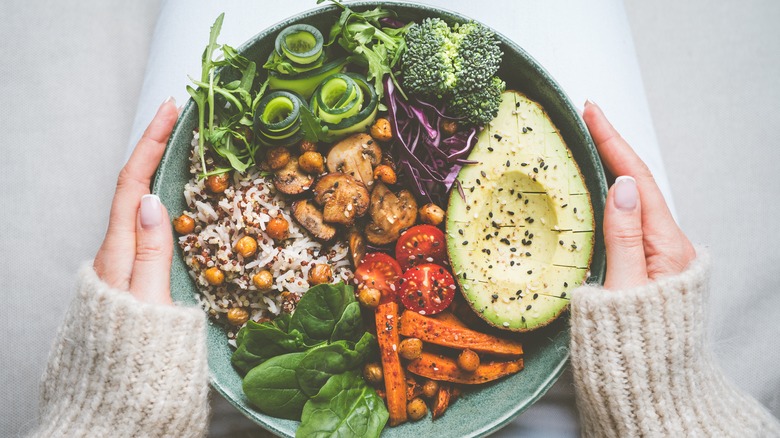Keto Vs Vegetarian Diet: What's The Difference?
While diet culture is definitely still a thing, adopting keto or vegetarian lifestyles may offer advantages — such as numerous health benefits, according to Healthline — that go beyond a number on the scale.
According to Healthline, a ketogenic diet is a high fat, super low carb diet that replaces carbohydrate calories with fats. The goal is to put the body into a state called ketosis, which burns fat as fuel.
Old School Labs explains when the body takes in carbohydrates, they are converted into glucose to use for energy. This conversion can spike insulin levels. By putting the body in ketosis, the body's primary source of fuel becomes fat instead of sugar, which stabilizes the blood sugar and lowers insulin levels, two biomarkers of metabolic syndrome (via Current Nutrition Reports). Originally used to treat epilepsy, researchers believe the keto diet aids in fat loss in part because of the satiety level of fats (via Fat Detection: Taste, Texture, and Post Ingestive Effects).
The standard keto diet is focused on whole foods with a macronutrient ratio of 70% fat, 20% protein, and 10% carbs (via Health). High fat content foods like meat and eggs are consumed along with keto-friendly veggies like cauliflower, cabbage, zucchini, broccoli, and spinach. Low carb fruits like berries and coconut are also encouraged, as are nuts and seeds and healthy oils for dressings (via Diet Doctor).
Can you be both keto and vegetarian?
While a vegetarian diet typically eschews meat, chicken, and fish, there are varying degrees of vegetarianism. Vegetarian diets range from veganism, which abstains from all animal products (for some, even forgoing honey), to diets that include eggs or dairy products, or both (via Healthline). Since protein sources are limited, a vegetarian diet include legumes and grains, as well as breads and pasta in addition to a rainbow of vegetables and fruits, which makes it higher carb (via WebMD).
Some people follow a vegetarian diet for ethical or environmental reasons, however there are proven health benefits. By eliminating meat, dietary intake of saturated fat lowers while vitamins, minerals, folic acid, and phytochemicals increase, which lowers bad cholesterol and blood pressure (via Harvard Health Publishing). Plant-based diets may even lower you risk of developing certain cancers.
While the two diets seem to be opposites, you can actually be both keto and vegetarian. Diet Doctor explains that by lowering carb intake to 20 grams per day and incorporating higher fat proteins like eggs and Greek yogurt as well as cheeses and nut butters, it is possible to have the health benefits of both diets. While being keto and vegan is possible, the vegan diet relies heavily on higher carb grains and legumes for protein intake, which makes keto harder to follow.
So, while keto-followers may not be able to have vegan cake, they can still enjoy some keto ganache.

